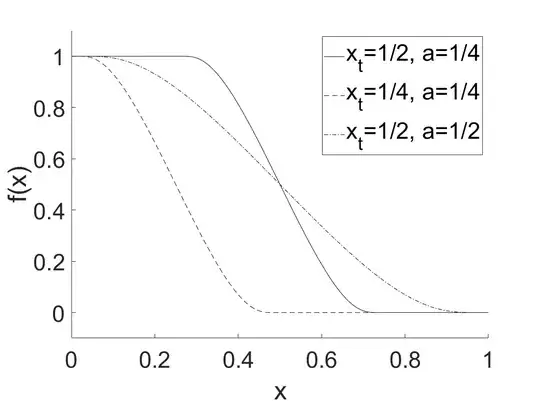The problem: I'm looking to construct a smooth function $f(x)$ for $x\in[0, 1]$ that satisfies the following simple constraints $$f(0)=1$$ $$f(1)=0$$ $$f'(0)=f'(1)=0$$
as well as the following general "transition" constraints $$f(x_t)=1/2$$ $$0\geq f'(x)\geq-s$$ $$f'(x_t)=-s$$
Here, $x_t\in(0, 1)$ is loosely a "transition" point where the transition from $f(0)=1$ to $f(1)=0$ is halfway done and "strongest" in a sense, controlled by the slope $s$.
My work so far: An example of such a function for $x_t=1/2$ and $s=\pi/2$ is
$$f(x)=\frac{1}{2}(1+cos(\pi x)).$$
However, I wish to primarily control $x_t$ while keeping a constant $s\geq1$ for a sufficiently "sharp" transition. The simple constraints above suggest a transition function (like the ones here) may be appropriate, but I can't work out one that also satisfies the general transition constraints. An approximate function can be constructed with a hyperbolic or inverse tangent function, such as
$$f(x)=\frac{1}{2}\left(1-\tanh\left(2s(x-x_t)\right)\right)$$
This satisfies the general transition constraints, but only approximately satisfies the the simple constraints for sufficiently large $s$. Because I will be varying $x_t$, the value of $s$ would need to be quite large to be sufficient. Therefore, I would prefer a function that exactly satisfies all the constraints.
I would appreciate any help constructing such a function! A simple closed form would be ideal, but I only need to be able to numerically evaluate the function for a set of points in $[0,1]$.
